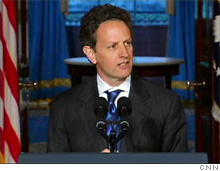Regulators put bank CEOs on notice
Banks that need capital after stress tests will have a month to give regulators a plan and to review management to make sure they have "sufficient expertise."
 |
| Banks will have a month to show regulators like Tim Geithner how they will satisfy stress test demands. |
NEW YORK (Fortune) -- Banks that need more capital under the stress tests will have a month to present regulators with a fundraising plan, federal officials said Wednesday.
The banks will have six months to raise the funds, according to a statement from the Treasury Department, the Federal Reserve, the Federal Deposit Insurance Corp. and the Office of the Comptroller of the Currency.
The banks will also have to review their management and board within a month, "to assure that the leadership of the firm has sufficient expertise and ability to manage the risks presented by the current economic environment," the bank regulators said in a statement Wednesday afternoon.
The announcement comes just a day before the results of regulators' Supervisory Capital Assessment Program, which covers the 19 biggest bank holding companies in the U.S., are due to be released to the public.
Wall Street has been eagerly awaiting the results since the government unveiled the stress test plan in February. The results of the tests were initially scheduled for release earlier this week, but the announcement was rescheduled for Thursday afternoon to allow banks a chance to review the findings.
But results of the tests have already started to leak out in the past few days. Bank of America (BAC, Fortune 500) is reportedly being told to raise $34 billion, while Wells Fargo (WFC, Fortune 500) is expected to be told to raise $15 billion.
Meanwhile other institutions, such as American Express (AXP, Fortune 500) and JPMorgan Chase (JPM, Fortune 500), are not expected to have to raise additional capital, according to published reports.
Also Wednesday, President Obama's top spokesman indicated that the government might lean on companies whose boards and managers aren't seen as up to snuff.
"The government has...weighed in on changes at the CEO level and at the board of directors level to ensure that...the management was in place to...ensure long-term viability without continued government assistance," Robert Gibbs said at a White House press briefing Wednesday.
The Obama administration forced former General Motors CEO Rick Wagoner to step down in late March after finding that the company did not have a long-term plan for viability.
Gibbs' comment comes just a week after Bank of America shareholders denied CEO Ken Lewis' bid for another term as the bank's chairman. BofA has already received $45 billion in federal capital, in addition to $118 billion of asset guarantees.
Regulators are focusing the test on the size of a bank's common stockholdings, according to the paper released Wednesday by Treasury Secretary Tim Geithner, Fed chief Ben Bernanke, FDIC chairman Sheila Bair and Comptroller John Dugan.
The paper says bank holding companies are being expected to have at least a 6% Tier 1 risk ratio and a 4% Tier 1 common risk ratio as of the end of 2010.
Those ratios emphasize the heft of the bank's common shareholding base, the regulators said, because a big shareholder base means a bank can take substantial losses without creating the potential for the bank's failure - a failure that taxpayers could end up on the hook for.
Analysts have said they expect many banks that need to raise capital under the stress tests to do so in part by converting existing preferred shares -- especially those held by private investors, rather than the government -- to common stock.
Doing so would dilute existing common shareholders, but won't lead to an increased government presence for the banks.
Bank stocks have rallied sharply in recent weeks, despite concerns about potential dilution, on rising hopes that the worst may be over for banks. Still, many experts remain concerned about the health of many of these institutions. ![]()
-
 The retail giant tops the Fortune 500 for the second year in a row. Who else made the list? More
The retail giant tops the Fortune 500 for the second year in a row. Who else made the list? More -
 This group of companies is all about social networking to connect with their customers. More
This group of companies is all about social networking to connect with their customers. More -
 The fight over the cholesterol medication is keeping a generic version from hitting the market. More
The fight over the cholesterol medication is keeping a generic version from hitting the market. More -
 Bin Laden may be dead, but the terrorist group he led doesn't need his money. More
Bin Laden may be dead, but the terrorist group he led doesn't need his money. More -
 U.S. real estate might be a mess, but in other parts of the world, home prices are jumping. More
U.S. real estate might be a mess, but in other parts of the world, home prices are jumping. More -
 Libya's output is a fraction of global production, but it's crucial to the nation's economy. More
Libya's output is a fraction of global production, but it's crucial to the nation's economy. More -
 Once rates start to rise, things could get ugly fast for our neighbors to the north. More
Once rates start to rise, things could get ugly fast for our neighbors to the north. More







